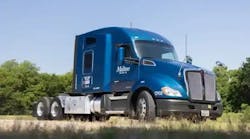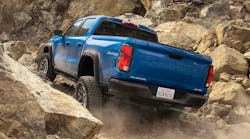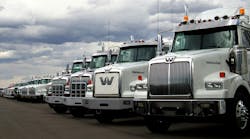Probably the most disturbing thing for me about post-September 11 transportation security efforts — five years after that horrible day — is how much time it's taking to get new procedures and technology in place. Not to mention how much resistance such efforts are facing.
After talking to several security experts about what is holding things up, I realize I'm not the only one who feels this way.
“The plain unvarnished truth is that nothing much is happening,” Erik Hoffer, president of CGM Security Solutions and long time member of the International Cargo Security Council, told me recently.
Sure, the U.S. government and private industry are developing electronic cargo seals, conducting more background checks on transportation personnel, and adding more border and port security procedures for freight, yet “many still feel that security tools are unnecessary, too expensive or too difficult to use,” Hoffer said.
“Anyone can rationalize anything away, but transportation providers and municipalities, along with [the federal] government, must become realists and allocate funding for a viable defense deployed throughout our transportation system,” he stressed.
The reason is pretty simple for Hoffer. He believes terrorists see ground vehicles as extremely enticing weapons. And we're not just talking about tractor-trailers here.
“We need to closely look at the vulnerability of all vehicles; including buses, garbage trucks and fire engines,” he told me. “These vehicles can easily be used to deliver a weapon almost at will. I mean, who really takes a second look at a fire engine racing down the street?”
Yet it's the lack of willingness to follow even some very basic, simple procedures that concerns Hoffer. Things like double-locking trailer doors or making sure trucks are not left idling while drivers and work crews leave them to get something to eat, for example.
“Many fleets aren't doing practical stuff because they don't want to spend any money outside of normal business costs or commit the time and resources,” he said.
Hoffer does see one bright spot in transportation security today — the continued growth of ATA's Highway Watch program. Highway Watch is training more and more professional drivers, ranging from school bus operators to long-haul truckers, to spot suspicious activity on the road and report it to law enforcement. “It's good because it gets drivers to look for potential terrorist activities, not people based on skin color or clothing style,” he added.
However, Hoffer remains convinced that everyone should be paying far more attention to the physical security of the truck.
I couldn't agree more. Security is now part of everyone's job description — fleet managers, drivers and mechanics. Everyone. Viewing security as someone else's problem is only going to set us up to experience another day like September 11.
John Taber, director or corporate security for National Retail Systems, feels strongly about this. “Before 9/11, the security mentality at a lot of transportation companies boiled down to ‘let's just make sure we are secure' and let other less-diligent firms deal with cargo theft and hijackings,’” he told me.
“Today, I can't think like that. I have two children, ages four and one-and-a-half, and they live 10 miles from New York City,” he explained. “I don't want to push the transportation security problem down the street, because a failure by one company puts their lives — all of our lives, actually — at risk. I need a new security mindset now.”


